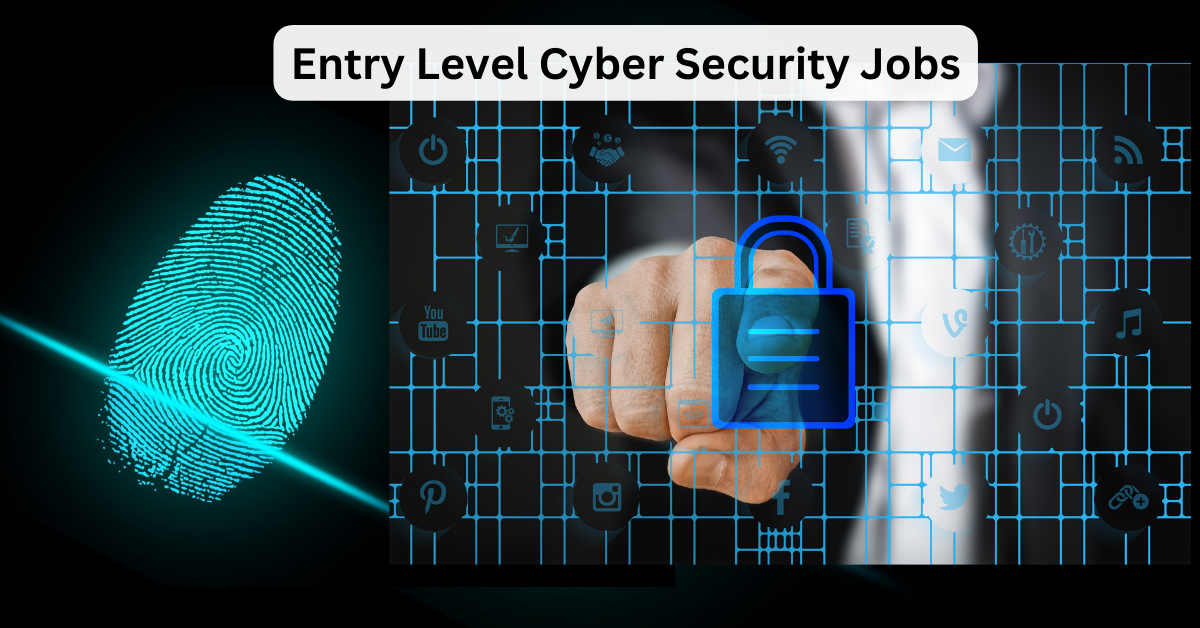Security is among the most in-demand fields currently, and there’s an increasing demand for experts who can protect the data of the world. If you’re considering starting the journey to a career within this thrilling field, you may be thinking about Entry Level Cyber Security Jobs. Whether you’ve had prior IT knowledge or not, this post will walk you through the fundamentals of entering the field, what you can anticipate, and how to start your first steps toward the perfect job in the field of cybersecurity.
What is the Entry Level Cyber Security Jobs?
In the case of beginning-level cybersecurity jobs, there are a handful of common positions to start from. These positions provide an excellent foundation for building your abilities and growing within the field. A sought-after position for entry-level jobs is an analyst in cybersecurity. Analysts are responsible for monitoring systems, identifying possible threats, and monitoring the security of information. They play a crucial part in preventing cyberattacks before they occur.
Another entry-level job that is popular is that of an IT Security Analyst who assists with the security of networks, ensuring the integrity of software tools, and making sure that the systems are operating efficiently without a single vulnerability. These positions are great for people who love solving problems and keeping up-to-date with the latest technology fashions.
Certain people could begin their career at an assistant desk post and gain an understanding of the basic IT concepts and administration of systems before moving on to more specific positions in cybersecurity.
No matter what the job title, the job will be a responsibility for protecting information, identifying threats, and educating yourself about security protocols for networks.
How Do I Get Into Cybersecurity without IT Experience?
Absolutely! The most attractive benefit of entry-level cybersecurity job opportunities is that it doesn’t require previous IT knowledge to start. A lot of people get into cybersecurity on various routes. Some might have a background in engineering or business or even the more conventional computer science fields. If you’re asking, “Can I get into cybersecurity without prior IT knowledge?” The answer is yes.
Although some knowledge of technology and systems could help, there are plenty of security accreditations and online courses that can equip you with the abilities to get started on the job. The CompTIA Security+ certification is a well-known entry-level certification that can aid you in attracting prospective employers. There are other certifications, such as Certified Information Systems Security Professional (CISSP) or Certified Ethical Hacker (CEH), which you can strive for as you progress in your knowledge.
Beyond certifications, soft abilities like critical thinking, problem-solving, and communication are incredibly sought after in this industry. You may be able to be employed in entry-level positions and gain the required skills to move into higher-level positions.
What is the salary of a BS in Cyber Security in Pakistan?
For those who are concerned about the financial aspects that come with cybersecurity, it is important to note that the salaries for cybersecurity entry-level jobs differ significantly based on location, the company, and the specific job. If you’re in Pakistan and hold a bachelor‘s degree in cybersecurity, you’re likely to get an attractive salary, even though it may be a bit lower than those in other countries, such as the US and Canada.
The median salary for a person who holds a bachelor’s degree in cybersecurity in Pakistan is generally between PKR 40,000 and PKR 80k per month for an entry-level position. However, it can differ depending on the particular job and the specific location in the nation. The larger companies and those located in technology hubs such as Lahore or Karachi might offer higher wages. Also, getting certificates and experience can boost your earnings potential over time.
What is Level 1 in Cyber Security?
1. Cybersecurity is generally the simplest job in the sector. These positions are perfect for those just beginning their journey and are learning the basics. If you’re new to the cybersecurity sector, your first job could be an Associate Security Analyst at Level 1, in which you’ll manage the monitoring of security alerts and assist in basic incident response, as well as conduct vulnerability assessments.
In these positions, you won’t be required to tackle complex issues by yourself but instead will be under the supervision of more experienced team members who will help guide your growth. As you develop experience and gain abilities, you’ll be able to move up to higher levels, like a Security Analyst at Level 2 and an Incident Response Specialist.
Key Skills for Entry-Level Cyber Security Jobs
You may be thinking about the possibility of taking on the role of a penetration testing or security consultant. There are fundamental skills that can make you successful in basic cybersecurity jobs. Here are a few of the most crucial:
- Technical knowledge: Understanding operating systems, networks, and security protocols is essential. A basic understanding of encryption, firewalls, and VPNs is extremely beneficial.
- Problem-Solving Cybersecurity professionals must be able to think critically and resolve problems swiftly, especially in the event of an attack or breach.
- Communication Skills: As cybersecurity professionals, you’ll have to communicate effectively with team members who are not technical and explain complex security concepts in a simple manner.
- Attention to Attention to cybersecurity requires a lot of focus on details, particularly when it comes to identifying weaknesses and analysing systems.
- Continuous learning: Cybersecurity is an ever-changing area, so you’ll have to keep up-to-date with the most current threats and techniques.

How to Break Into the Cybersecurity Field: A Step-by-Step Guide
Beginning a career in cybersecurity does not have to be difficult. Follow this step-by-step procedure to get into basic cybersecurity positions:
- Step 1: Get the Right Education
No matter if you choose to pursue a bachelor’s education or a certificate in computing sciences, information technology, and cybersecurity, education is crucial. Although a college degree isn’t necessarily needed, it does improve your chances of securing the job you want. You can also enrol in online courses to complement your knowledge. - Step 2: Earn Cybersecurity Certifications
As we mentioned, certifications such as CompTIA Security+, CISSP, and the Certified Ethical Hacker (CEH) are excellent ways to prove your knowledge to prospective employers. - Step 3: Gain Experience Through Internships or Volunteer Work
Volunteering and internships will give you hands-on experience and allow you to apply the lessons you’ve learned to real-world situations. - Step 4: Network and Build a Personal Brand
Join communities in cybersecurity, attend conferences, and be engaged on social media sites like LinkedIn to connect with experts working in the field. This will let you know about new opportunities and the latest trends in the field. - Step 5: Apply for Entry-Level Jobs
Once you’ve gained the knowledge and skills, you can begin applying for cybersecurity entry-level job opportunities. Be sure to highlight on your resume your educational background and certificates, as well as relevant experience. - Step 6: Continue Learning and Advancing
The field of cybersecurity is always changing, and it’s essential to continue learning. As you acquire more experience, you’ll be able to to take on more advanced certifications or positions.
Final Thoughts
Cybersecurity entry-level positions are a great opportunity to enter the technology industry and begin an enjoyable career. If you have an academic background or are looking to change career paths, there are plenty of opportunities to be involved. With the right education, qualifications, and expertise, you’ll be able to quickly rise through the ranks of cybersecurity.
The field is a great one for career security, opportunities for growth, and the opportunity to have a significant contribution to the protection of personal and corporate data. So, don’t hesitate to begin your journey to cybersecurity now!
If you’re starting out, roles like Cybersecurity Analyst Jobs are a great next step after landing entry level cyber security jobs, as they help you grow your skills while protecting systems from real threats.

